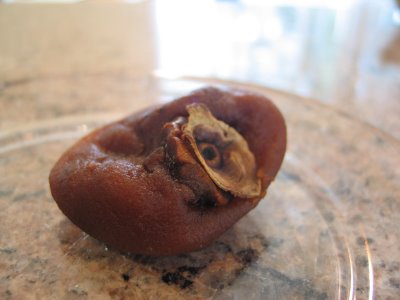 Dried Persimmon: No, it's not a prehistoric beast.
Dried Persimmon: No, it's not a prehistoric beast.When I was very young, long before I was allowed to have tea or coffee, I was given a cup of Sujonggwa (Soo-jung-gwa). It was probably winter or fall, as this is usually made during cold months in Korea. It was probably outside of my home too since, now that I think about it, my family prefers to eat dried persimmons on their own. When dried, persimmon flesh becomes chewy and even more sweet with a tinge of earthy scent. If you've ever tried to dry them yourself, you know that they naturally get a snow white, powdery coat of sugar which can be quite a sight. Good dried persimmons are hard to get by and I don't think that my family, who knows a good thing when they see it, would have sacrificed a perfectly good dried persimmon to make cinnamon-ginger tea. To make sujonggwa, you put together cinnamon stick, ginger and sugar and boil in water. Then you pour the liquid over the dried persimmon, let it soak in liquid and chill. It's just short of barbaric if you like dried persimmon.
To me at the time, however, it was the closest I could get to a civilized drink. The delicate aroma of cinnamon and not-too-overpowering taste of ginger in the tea, not to mention the soft persimmon flesh and the few pine nuts that floated on top of the tea, made me feel like a grown up enjoying a very posh drink. I might pretend to take Sujonggwa as my aperitif and go read in the conservatory, thank you very much. Needless to say, we didn't have a conservatory and we never had any aperitifs in the house because someone in the house was perpetually off the wagon. Perhaps it was the rarity with which I was given this tea, precisely for the reason I stated above, that made it special to have it. These days, when I am served this drink after a meal at a Korean restaurant, I hesitate to take a sip because, in general, it's not more than sugar water with cinnamon flavor.
So when I saw these dried persimmons in my parents' fridge the other day, I had to wonder. Hmmm. Could I take some to make sujonggwa? I thought about it but when I saw my sister gingerly taking one out and putting it on a plate to eat by itself, I couldn't do it. Afterwards, I learned that they were specially brought back from Korea on my parents' recent trip there (after 20 years!). Quality Korean goods, you know. I guess I'll have to settle for my Hediard fruit blend tea.
To make sujonggwa, you'll need cinnamon stick, ginger, sugar, dried persimmons and water. Go easy on the ginger as it can overwhelm other flavors. I'd use about 1-2 cinnamon stick and a thumb sized, sliced ginger with 1/2 c. - 1/c of sugar to about 4-5 cups of water. Boil together and let it cool. Pour liquid over dried persimmons and chill overnight. Strain liquid since, obviously, you don't eat cinnamon stick or the ginger. Sprinkle few pine nuts in tea.
2 comments:
Hello - I read this blog post with fascination! I have a blog on tea (and the larger world around it). I recently posted about persimmions, but had not known of this connection to tea. Thank you for sharing with me!
What a strange picture but your story reminds me of my childhood as at the weekends we would visit an aunt and sit outside on garden cushions and she always served unusual treats that I never really found out what they were but I do remember they always tasted strange.
Post a Comment